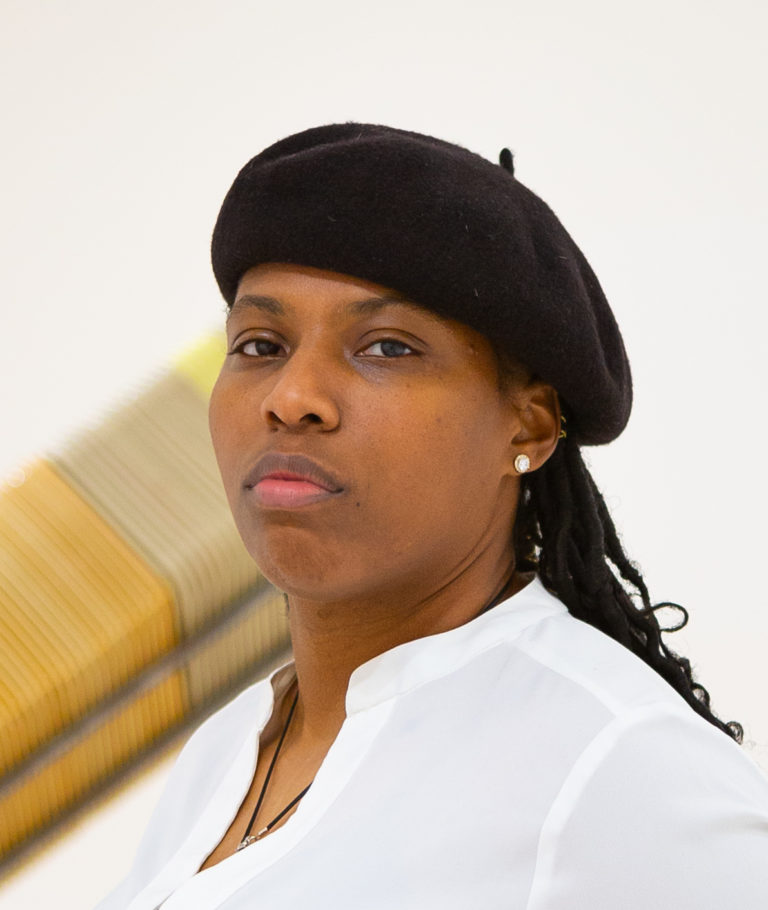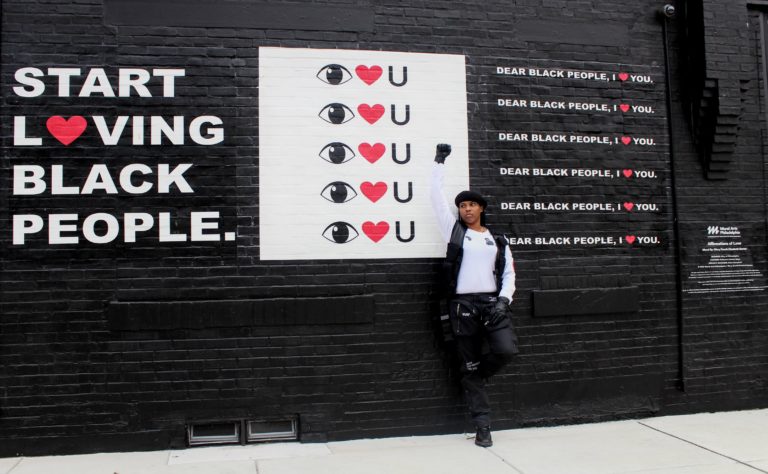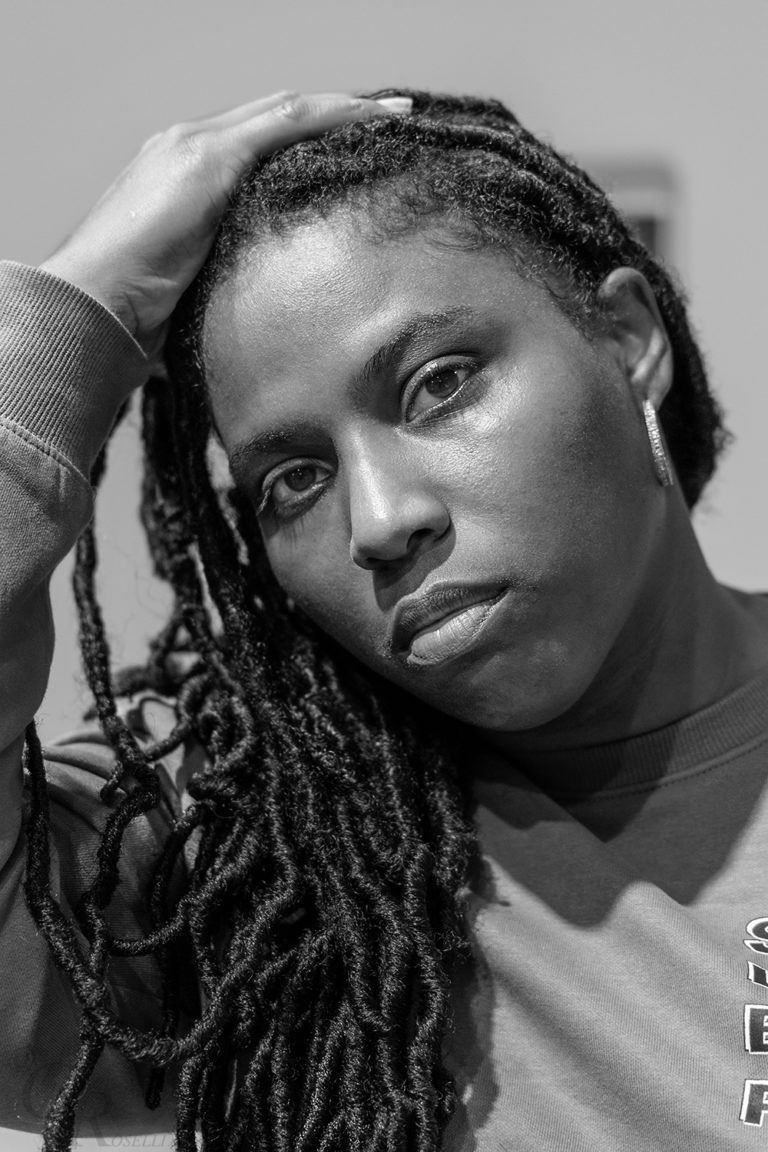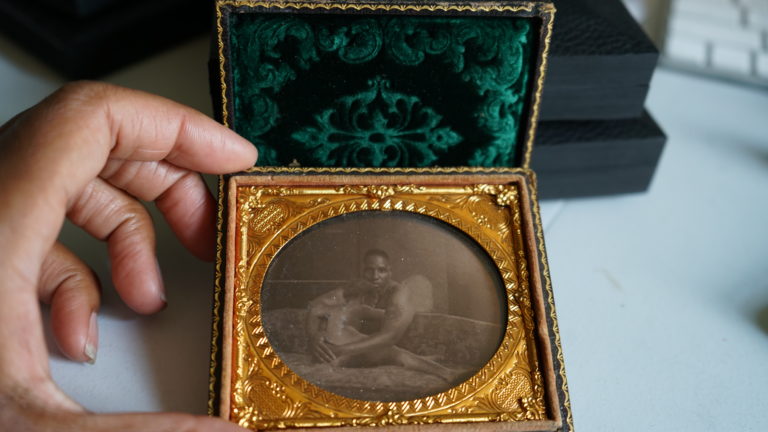2022 Corrina Mehiel Fellow
Mary Enoch Elizabeth Baxter, artist

Meet Mary (she/her): Mary Enoch Elizabeth Baxter is an award-winning Philadelphia based artist who creates socially conscious music, film, and visual art through an autobiographical lens.
Although it has been a decade since her release from a Pennsylvania prison, Mary’s time spent on the inside continues to shape the direction of her art and practice. Her entertaining but poignant works offer a critical perspective on the particular challenges women of color face when they become immersed in the criminal justice system. Her work has been exhibited at venues including MoMA PS1, African American Museum of Philadelphia, Eastern State Penitentiary, Ben & Jerry’s Factory in Waterbury Vermont, Martos Gallery and HBO’s The OG Experience at Studio 525 in Chelsea among others. Ms. Baxter is also 2017 Soze Right of Return Fellow, 2018 and 2019 Mural Arts Philadelphia Reimagining Reentry Fellow, 2019 Leeway Foundation Transformation Awardee, 2021 Ed Trust Justice Fellow, 2021 SheaMoisture and GOOD MIRRORS Emerging Visionary grantee and 2021 Frieze Impact Prize award winner.

S.O.U.R.C.E.: What values of the Corrina Mehiel Fellowship or S.O.U.R.C.E. stood out to you or resonated most with you and your work?
Mary: Advocating alongside Black women and girls is a fundamental component of my work as a multidisciplinary artist, advocate and educator. Whether it’s creating works that align with reproductive justice rights for incarcerated women or investigating the impacts of adultification bias on young Black girls, my art and practice remains committed to utilizing my own personal experience as a point of reference to connect, engage and uplift the particular challenges faced by these two unique groups.
Source Studio’s commitment to support women, trans and non-binary artists who use art as a means to address pressing social issues proved to be a critical factor in me applying for the Corrina Mehiel Fellowship. I believe that receiving this fellowship will not only provide me the necessary artistic mentorship and resources needed to scale the scope of my current series “Consecration to Mary, 2021” but also grant me the ability to cover self-care costs and other project related expenses.
S: How would you describe your community and what sort of encounters with your work do you hope your community might experience?
M: As an artist who creates from a place of lived experience, I am very connected to the communities in which I live and serve. I enter spaces with an empathic lens, authenticity and shared vision. When interacting within the context of community, I seek out equitable partnerships that empower all parties involved. As someone who has endured the effects of mass incarceration, racial exploitation and gender oppression, I know how harmful and callous it is to not take direction and feedback from those with lived experience. The sole purpose of my work is to create agency and a safe space for Black women and girls to develop their own solutions for their own problems. This has included focus groups, workshops at local prisons and/or opportunities to co-create meaningful art by actively inviting the voices of those directly impacted.

S: What role does curiosity play in your work and what are you curious about exploring in the year to come?
M: Currently, I’m really interested in exploring the ways in which race, gender and crime intersect and impact the lives of Black women and girls in the United States.
In my opinion, it’s no coincidence that 85% of incarcerated women have been victims of sexual violence, which many are now calling the “sexual abuse to prison pipeline.” So for my most recent work, “Consecration to Mary, 2021.”, I did what I’ve spent the majority of my life doing: using art as activism. As a survivor of childhood sexual abuse, I felt compelled to reimagine American artist Thomas Eakins exploitative photography “African American Girl Reclining Nude on sofa” (Front and rear view photos) which depicts a young pre-pubescent Black girl forced to pose nude inside his home studio in 1882. My reinterpretations provide a counter narrative where I insert my own image in an effort to help shield the child from his predatory gaze.
Since unveiling the series in September at Martos Gallery in NYC, I’ve written an op-ed for the Philadelphia Inquirer and launched an online petition to denounce the progression of institutional failures at the Pennsylvania Academy of the Fine Arts (PAFA) to address its dissemination of sexually explicit photographs of children and its active erasure of violent acts committed by Thomas Eakins on their website. After penning my op-ed, PAFA used my artist statement and name to align themselves in support of my work but failed to ask for my endorsement, and neither denounced Eakins or formally apologized to those hurt most by their veneration of a documented sexual predator, namely Black women and girls in the city of Philadelphia.
In 2 weeks, the petition amassed nearly 300 signatures, including esteemed colleagues, artists, cultural producers, community members, and writers like MacArthur Fellows Fred Moten and Dr. Nicole Fleetwood, Art Handlers Alliance, Xaviera Simmons, Sara Goldrick-Rab, Kate Fowle, Dylan Rodriguez, Molly Gochman, and Gorilla Girls among many others. Since then, The Art Newspaper has also provided global coverage of my work surrounding Eakins and my fight for institutional accountability at PAFA.
In the coming year, I plan on expanding the campaign through continued public discourse, community forums and community led direct actions. By prioritizing healing, leveraging communal support and taking accountability for reimagining our own narratives, my work looks to challenge the mainstream ideals and societal norms that surround gender justice and public safety by uplifting the voices of those who have been impacted the most.
